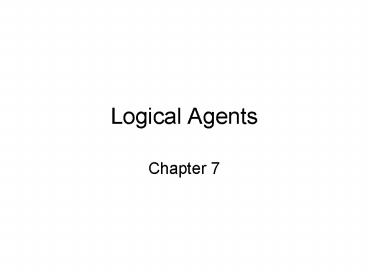Logical Agents - PowerPoint PPT Presentation
1 / 13
Title:
Logical Agents
Description:
If S is a sentence, S is a sentence (negation) ... the ability to represent partial and negated information, reason by cases, etc. ... – PowerPoint PPT presentation
Number of Views:65
Avg rating:3.0/5.0
Title: Logical Agents
1
Logical Agents
- Chapter 7
2
Outline
- Knowledge-based agents
- Logic in general
- Propositional (Boolean) logic
- Equivalence, validity, satisfiability
3
Knowledge bases
- Knowledge base set of sentences in a formal
language
- Declarative approach to building an agent (or
other system) - Tell it what it needs to know
- Then it can Ask itself what to do - answers
should follow from the KB
- Agents can be viewed at the knowledge level
- i.e., what they know, regardless of how
implemented
- Or at the implementation level
- i.e., data structures in KB and algorithms that
manipulate them
4
A simple knowledge-based agent
- The agent must be able to
- Represent states, actions, etc.
- Incorporate new percepts
- Update internal representations of the world
- Deduce hidden properties of the world
- Deduce appropriate actions
5
Logic in general
- Logics are formal languages for representing
information such that conclusions can be drawn
- Syntax defines the sentences in the language
- Semantics define the "meaning" of sentences
- i.e., define truth of a sentence in a world
- E.g., the language of arithmetic
- x2 y is a sentence x2y gt is not a
sentence
- x2 y is true iff the number x2 is no less
than the number y
- x2 y is true in a world where x 7, y 1
- x2 y is false in a world where x 0, y 6
6
Propositional logic Syntax
- Propositional logic is the simplest logic
illustrates basic ideas
- The proposition symbols P1, P2 etc are sentences
- If S is a sentence, ?S is a sentence (negation)
- If S1 and S2 are sentences, S1 ? S2 is a sentence
(conjunction)
- If S1 and S2 are sentences, S1 ? S2 is a sentence
(disjunction)
- If S1 and S2 are sentences, S1 ? S2 is a sentence
(implication)
- If S1 and S2 are sentences, S1 ? S2 is a sentence
(biconditional)
7
Propositional logic Semantics
- Each model specifies true/false for each
proposition symbol
- E.g. P1,2 P2,2 P3,1
- false true false
- With these symbols, 8 possible models, can be
enumerated automatically.
- Rules for evaluating truth with respect to a
model m
- ?S is true iff S is false
- S1 ? S2 is true iff S1 is true and S2 is
true - S1 ? S2 is true iff S1is true or S2 is true
- S1 ? S2 is true iff S1 is false or S2 is true
- i.e., is false iff S1 is true and S2 is false
- S1 ? S2 is true iff S1?S2 is true andS2?S1 is
true
- Simple recursive process evaluates an arbitrary
sentence, e.g., - ?P1,2 ? (P2,2 ? P3,1) true ? (true ? false)
true ? true true
8
Truth tables for connectives
9
Wumpus world sentences
- Let Pi,j be true if there is a pit in i, j.
- Let Bi,j be true if there is a breeze in i, j.
- ? P1,1
- ?B1,1
- B2,1
- "Pits cause breezes in adjacent squares"
- B1,1 ? (P1,2 ? P2,1)
- B2,1 ? (P1,1 ? P2,2 ? P3,1)
10
Truth tables for inference
11
Logical equivalence
- Two sentences are logically equivalent iff true
in same models a ß iff a ß and ß a
12
Validity and satisfiability
- A sentence is valid if it is true in all models,
- e.g., True, A ??A, A ? A, (A ? (A ? B)) ? B
- Validity is connected to inference via the
Deduction Theorem - KB a if and only if (KB ? a) is valid
- A sentence is satisfiable if it is true in some
model - e.g., A? B, C
- A sentence is unsatisfiable if it is true in no
models - e.g., A??A
- Satisfiability is connected to inference via the
following - KB a if and only if (KB ??a) is unsatisfiable
13
Summary
- Logical agents apply inference to a knowledge
base to derive new information and make decisions
- Basic concepts of logic
- syntax formal structure of sentences
- semantics truth of sentences wrt models
- entailment necessary truth of one sentence given
another
- inference deriving sentences from other
sentences
- soundness derivations produce only entailed
sentences
- completeness derivations can produce all
entailed sentences
- Wumpus world requires the ability to represent
partial and negated information, reason by cases,
etc.
- Resolution is complete for propositional
logicForward, backward chaining are linear-time,
complete for Horn clauses
- Propositional logic lacks expressive power































